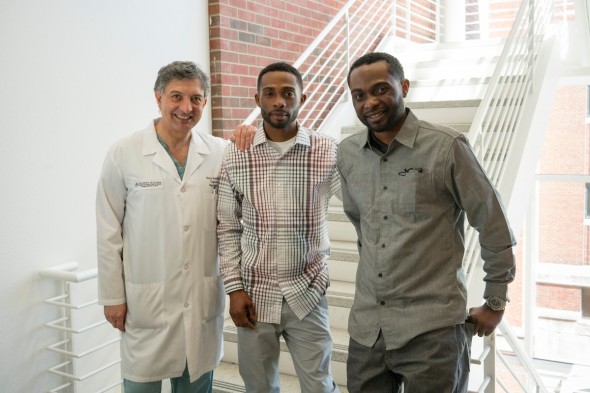Twin donates part of small bowel in rare transplant
Patrick Noel was on his way home from his brother’s house July 24, 2016, when a car pulled up next to him. The stranger in the other car asked Patrick if he lived in the neighborhood. Sensing something was wrong, Patrick hesitated briefly, but said that yes, he was from Calumet City. The man looked at Patrick, pulled out a gun and shot at him 10 times before driving off.
It was a case of mistaken identity.
Six shots hit Patrick; one grazed his head, others hit his back, foot and leg.
Another bullet pierced the blood vessels supplying his small intestine, and the organ quickly began to die.
An ambulance rushed Patrick, 32, to a nearby hospital where surgeons worked to remove the bullets. Because of blood loss, he lost his small bowel and about half his colon.
For months afterward, his stomach emptied directly into a colostomy bag and even as he received nutrition intravenously, Patrick was quickly losing weight.
Doctors at the hospital warned Patrick that he would more than likely require a small bowel transplant. The small bowel, also known as the small intestine, is responsible for absorbing nutrients from food. If either damaged or removed, patients must receive nutrition intravenously which carries risks of line infections and liver failure.
Luckily, Patrick had a perfect match for a transplant: his identical twin brother, Derrick.
“When the doctors found out that I was Patrick’s twin, they hinted that down the road I might be asked to donate part of my small bowel to him, and I was fine with that right from the start,” Derrick said.
In September, Patrick was referred to Enrico Benedetti, professor and Warren H. Cole Chair of Surgery at the University of Illinois Hospital. A renowned transplant surgeon, Benedetti has performed approximately two-thirds of the world’s small bowel living donor transplants. He is also one of just four surgeons worldwide to have performed an identical twin living-donor small bowel transplant. Only four of these surgeries had been performed worldwide.
It looked like Patrick had found another perfect match in Benedetti.
“When I learned that Patrick had an identical twin willing to make the donation, I knew that a living-donor transplant would not only be possible, but because his brother is a genetic match, he is also a perfect match,” Benedetti said. “Rejection and infection are the two main concerns for any transplant, especially opportunistic infections that arise due to the immune-suppressing anti-rejection drugs. Because of Derrick, Patrick effectively avoids both these risks.”
Because Derrick was a perfect match, Patrick wouldn’t need to take immunosupressive drugs to prevent organ rejection. Most transplant patients require these drugs for the rest of their lives.
Before Benedetti could perform the transplant, in addition to the intravenous feedings, he needed Patrick to start eating solid, soft foods, as well as broths and soups.
“If he could absorb at least some water through his remaining large bowel, it would be a big improvement,” Benedetti said.
After Benedetti attached the bottom of Patrick’s stomach to what was left of his large bowel, his weight loss began to slow.
On April 27, the Noel twins underwent the transplant surgery.
Benedetti and Ivo Tzvetanov, associate professor of transplant surgery in the UIC College of Medicine, removed about 7 feet of the small intestine from Derrick — most people have about 20 feet of small intestine — and used it to connect Patrick’s stomach and large bowel. The surgery went smoothly and both brothers recovered rapidly.
“Because Patrick is doing so well due to the fact that his new organ is a perfect match, we plan to get him off the intravenous feeding in less than half the normal time,” Benedetti said.
Derrick is planning to return to work as a barber as Patrick continues to gain weight and strength at home.
Derrick never thought twice about undergoing the operation to help his brother, said a grateful Patrick.
“He didn’t ask any questions,” Patrick said. “He just said, ‘Yes.’”
Categories
Topics

